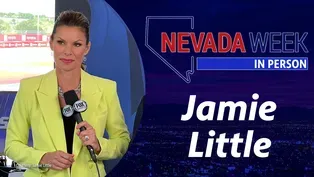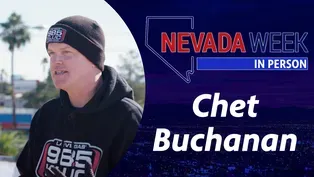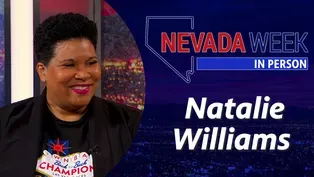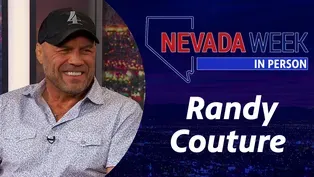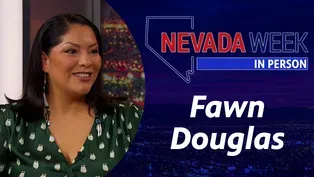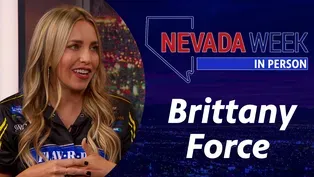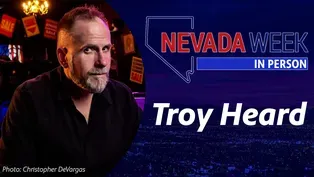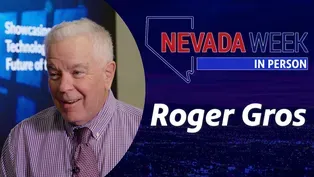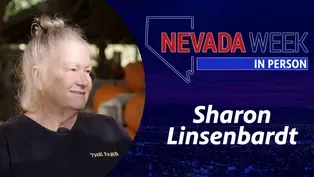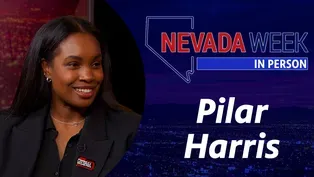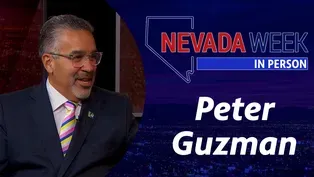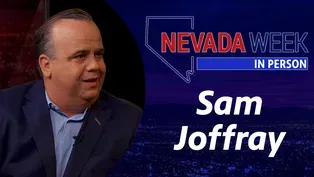
Nevada Week In Person | Brett Torino
Season 1 Episode 66 | 14mVideo has Closed Captions
One-on-one interview with developer and philanthropist Brett Torino.
One-on-one interview with developer and philanthropist Brett Torino.
Problems with Closed Captions? Closed Captioning Feedback
Problems with Closed Captions? Closed Captioning Feedback
Nevada Week In Person is a local public television program presented by Vegas PBS

Nevada Week In Person | Brett Torino
Season 1 Episode 66 | 14mVideo has Closed Captions
One-on-one interview with developer and philanthropist Brett Torino.
Problems with Closed Captions? Closed Captioning Feedback
How to Watch Nevada Week In Person
Nevada Week In Person is available to stream on pbs.org and the free PBS App, available on iPhone, Apple TV, Android TV, Android smartphones, Amazon Fire TV, Amazon Fire Tablet, Roku, Samsung Smart TV, and Vizio.
Providing Support for PBS.org
Learn Moreabout PBS online sponsorshipMore from This Collection
Nevada Week In Person | Jamie Little
Video has Closed Captions
One-on-one interview with Jamie Little, NASCAR Broadcaster (14m)
Nevada Week In Person | Chet Buchanan
Video has Closed Captions
One-on-one interview with Chet Buchanan,Host & Creator, 98.5 KLUC’s The Chet Buchanan Show (14m)
Nevada Week In Person | Natalie Williams
Video has Closed Captions
One-on-one interview with Natalie Williams, General Manager, Las Vegas Aces (14m)
Nevada Week In Person | Randy Couture
Video has Closed Captions
One-on-one interview with Randy Couture, UFC Hall of Famer & U.S. Army Veteran (14m)
Nevada Week In Person | Fawn Douglas
Video has Closed Captions
One-on-one interview with Fawn Douglas, Artist and Activist, Nuwu Art (14m)
Nevada Week In Person | Brittany Force
Video has Closed Captions
One-on-one interview with Brittany Force, World Champion Drag Racer (14m)
Nevada Week In Person | Troy Heard
Video has Closed Captions
One-on-one interview with Troy Heard, Artistic Director, Majestic Repertory Theatre (14m)
Nevada Week In Person | Roger Gros
Video has Closed Captions
One-on-one interview with Roger Gros, Publisher, Global Gaming Business Magazine (14m)
Video has Closed Captions
One-on-one interview with Sharon Linsenbardt, Owner, Las Vegas Farm and Barn Buddies Rescu (14m)
Nevada Week In Person | Pilar Harris
Video has Closed Captions
One-on-one interview with Pilar Harris (14m)
Nevada Week In Person | Peter Guzman
Video has Closed Captions
One-on-one interview with Latin Chamber of Commerce Nevada President & CEO Peter Guzman (14m)
Nevada Week In Person | Sam Joffray
Video has Closed Captions
One-on-one interview with Sam Joffray, President & CEO, Las Vegas Super Bowl LVII Host Com (14m)
Providing Support for PBS.org
Learn Moreabout PBS online sponsorshipAs a local builder, developer, philanthropist, and environmentalist, Brett Torino is our guest this week on Nevada Week In Person .
♪♪♪ Support for Nevada Week In Person is provided by Senator William H. Hernstadt.
-Welcome to Nevada Week In Person .
I'm Amber Renee Dixon.
Despite reportedly developing and constructing more than $1.5 billion worth of properties in Southern Nevada, he considers his greatest accomplishment to be Torino Ranch, a summer camp for terminally ill and emotionally wounded children.
Brett Torino, thank you for joining us for Nevada Week In Person .
(Brett Torino) Pleasure.
Thank you for having me.
-Torino Ranch has been in existence about 30 years now.
-Yes.
-Your passion for helping these children, where does it stem from?
-It's hard not to appreciate these kids, you know?
You grow up, and you carry certain things forward.
And, you know, I've always had a soft spot for children.
And when you meet children that have issues and they're challenged and they're so brave and courageous, it's really hard not to want to do everything you can to help them.
So we do.
We've made a life of it.
-And you've made a lifetime for these children of memories.
And it's generational-- -It is.
- --you were telling me off camera.
How so?
-Well, we have kids that attended that had cancer, or other types of-- You know, we've run many types of groups, but cancer is primarily what we do.
Young men and women.
And so they've been through our programs as kids, they have graduated to counselors.
Obviously, they went into remission.
They move on from counselors to volunteers.
They'd been married, and they brought their children out to the ranch just to see what is taking place.
It's pretty incredible.
-It is.
And when you reflect on that, what do you think?
-It makes you feel terrific.
It's 30 years of doing this.
So, you know, you get to a point where you look back and you think, wow, you know, it really stands for something.
-You have stood for a lot within philanthropy and development, using the word "courage" to describe those children.
You've been courageous in both development and in changing the world in a positive way.
Let's start with the development aspect.
Of the many Strip properties that you've owned, what took the most courage to buy and develop?
-All of them.
-Okay.
-You know, we have a nationally-based company.
So we do a lot of different things, but this is home.
And on the Strip, I've probably done 15 or 16 projects now.
And it's well in excess of $1.5 billion.
But we know that market.
And every down market that's ever existed here, from 9/11 to the banking debacle, to COVID and going back past COVID, I mean, before COVID, there's been four cycles here, and we've always purchased in a down market.
-9/11, tell me about that time.
What were people advising you?
-They weren't advising me anything.
They were telling us we were crazy.
Lyle Berman, who had built the Stratosphere, approached me.
And this was two weeks after 9/11.
And the town was just shut down.
People were still worried about airplanes coming in.
You had all the different threats.
And Lyle said, Would you consider buying the rest of my land?
And that's the whole block across from CityCenter.
Ultimately, my partner and I ended up owning all the land.
In fact, I met him while doing that deal.
It was 25 years ago.
And Lyle said, There's only one catch: You have to close it before the end of the year.
You didn't have a lender really in America, North America, that wanted to do a deal at that time.
We got a deal done.
So it's pretty incredible.
And all the deals have-- They seem that way for one reason or another.
But it's exciting.
It's a very competitive place to do business.
-What does it mean to be a Strip property owner?
-It's special.
You know, Welcome to the club.
I mean, it takes a lot of different disciplines and different attributes to be able to get in a market so competitive and-- -Like what?
What kind of disciplines?
-Well, I think it takes a lot of tenacity.
You got to be a risk taker.
You got to think out of the box.
You have to be very creative.
You have to be a great salesperson.
You know, you have to be a great psychic.
You have to be a great "a lot of things."
But you know, it takes vision.
And you're not-- It's not a cookie-cutter type place.
You're going to come to play.
So when you come down there, you're gonna have to be out of the box, because there's no "been there and done it" and you're gonna follow that.
It just doesn't work that way.
-When you say "psychic," what are you referring to?
-Well, you know.
I mean, the bottom line is we can always say how smart we are.
But you got to get lucky too.
And so you're going to work hard, you're going to take on risk, but you got to hit it right.
And, you know, you gotta believe in your, in your intuition.
And so that's, that's the Strip.
-You did talk about buying during COVID.
That's 63, the project that's Harmon and Las Vegas Boulevard.
Also during the recession.
And both times the local papers quoted people saying you bought at way too high of a price?
-Of course, we always have.
-Okay.
-And they're saying it again now-- - --with the latest-- - --with the Convention Center piece.
-And that was how much?
125-- -It's 125 million.
- --million.
Okay.
With your partner.
What are your plans for that?
-You know, I can tell you what we're comfortable doing.
The great thing is that with the Fountain Blue opening and Resorts down there, there's a lot of traffic.
People want to be out on the Strip.
They want to be walking.
We see it more and more.
They don't come to hunker down in a hotel like they used to.
And all the Strip owners accept that.
You got movement all the time.
If you go down to Convention Center today, you've got a lot of traffic.
And they stop there.
They're looking for something to do.
So we believe, I believe, we believe they're going to start migrating further north, and we're betting on that.
And we're gonna get that traffic.
And the type of interest that we've had from, you know, incredible land-based entertainment companies, which I'm not at liberty to share, we're gonna put together something I think really terrific down there.
-So some form of entertainment versus retail, which you have plenty of experience in?
-No.
Well, it's land-based entertainment.
It's retail and entertainment mixed.
We have other projects we own elsewhere in the country.
And this is the market we understand.
My partner is a big hotel guy.
He understands the hotel market certainly a lot better than I do.
So there's an aspect-- There's certainly a need down at that end of the Strip for a great business hotel that doesn't exist.
So it's something we're looking at, you know, in combination with other things.
-Okay.
So you're gambling on it, like you said-- -Yes.
- --which requires a bit of courage.
Let's get back to the courageous aspect of making a positive difference in the world.
When has there been a time where you really had to muster up courage in order to make a positive change?
And why is that necessary for positive change?
Why do you have to be brave?
-Because you're always going to-- You know, there's a lot of people that feel different than you do.
You're up against institutions.
You're up against bureaucracies.
I mean, you get-- You see the whole gamut of it.
And human nature, everybody's out to protect their slice of the pie.
Irrespective of what they believe, if they put food on the table through what they believe in, you know that's something they're going to be passionate about advocating for.
And it's not necessarily in the public's best interest.
So I think when you have the ability, which you know, if I take all my disciplines from business and I bring them to something that I'm passionate about, then I'm going to be a strong advocate for what I believe in, and it's going to be hard to shut me down.
And it's not about money.
It's just, you know, there's just, you look at a community like Las Vegas.
Las Vegas is a big engine, and it's done right by so many people.
We're such a prosperous community for so many reasons.
We owe it to this community to protect an environment, a lifestyle, because people that are younger than I am are coming here today, and they come for lifestyle.
It's very important.
And if you can't protect lifestyle, you're not going to attract good people that are the future of this community.
So at some point you got to get past yourself, and you've got to be passionate about something that makes this community better.
-And the lifestyle you're talking about is outdoor recreation, enjoying the wilderness-- -Yeah.
- --having that option-- -Absolutely.
- --instead of just the city.
-Yeah.
-So, Save Lovell Canyon.
-Yes.
-Your efforts there, how are they going, and what kind of backlash have you faced?
-Well, so a very dear friend of mine--we were roommates when we were teenagers here, Pauline Van Betten--was part of the group that founded Save Red Rock.
So when Lovell Canyon started to get into disarray, and it was horrible what was going on back there.
And I'm not singling out a group of people and saying they're all bad.
But you have a certain element of people where 2- or 3% of the people that are bad take up 98% of the resources of this country.
And you see it over and over again.
Those 2- or 3% can create a lot of damage.
So Lovell Canyon was getting decimated.
It was getting burned up, blown up, graffitied up, and it was really turning into a lawless area.
And part of the bureaucracy is saying, Well, that's okay.
You know, we'll just keep them over there.
-I mean, it's a little bit of the Wild West mentality that some say Las Vegas still has.
-Yes.
And they do, and that's fine.
But even so, we only have so much to protect here in outdoor recreation: We have Lake Mead, we have Mount Charleston, we have Red Rock, and we have Lovell.
And I say Lovell, Red Rock, and Mount Charleston is this triple crown of beautiful pine trees and recreation.
So you can't mess it up.
You got to protect it.
We went in there.
We protected it.
I was on the front end of that.
Very controversial, you know, because you're moving a bad element somewhere else.
And people don't want you to move it sometimes.
It's just moving a problem.
Deal with the problem, but you're not going to deal with it in my backyard.
And yeah, it took a lot.
But it's gone great.
There's a big cleanup there this Sunday again, and they have them all the time.
And you know, we're a big part of it, because we have interest in the Canyon, but it goes beyond self-interest.
-You were able to discover this use of that area-- -Yes.
- --via helicopter.
-Well, that's one aspect to it.
You know, I've done over 250 adventure races: ultra marathons, marathons, and I used to cycle when I was 20 years old training for Ironman and Ultraman, you know, 4- or 500 miles a week throughout Southern Nevada.
And so I got to learn it well.
As helicopters became my passion-- And it's, you know, I call it another career.
I spend a lot of time in the air.
And what a great privilege to be able to see things three dimensionally.
So what others can't see from the road, I see every aspect of it when I'm flying around here and other places in the country.
And you start to really see what works, public policy, what doesn't work, what's being pushed into the foreground, into the background, and it's given me a real interesting perspective to what happens in this community.
-It makes me think of the land availability issue, what's needed.
Some would say more land is needed for affordable housing.
Where do you stand on that as a developer and an environmentalists?
The two can coexist.
-They absolutely can coexist.
There's a lot of land out there.
And I think a lot of times, again, people start protecting their turf.
We have land.
We have everything we need a lot of, except, you know, the big concern is water today.
But water can get resolved too when push comes to shove.
We're good.
We got everything we need.
-And part of that is because of the recycling of water that we do here in Southern Nevada.
-Incredible effort.
-Brett Torino, thank you so much for joining us on Nevada Week In Person .
And to see more of Nevada Week In Person , go to vegaspbs.org/nevadaweek.
♪♪♪
Support for PBS provided by:
Nevada Week In Person is a local public television program presented by Vegas PBS
